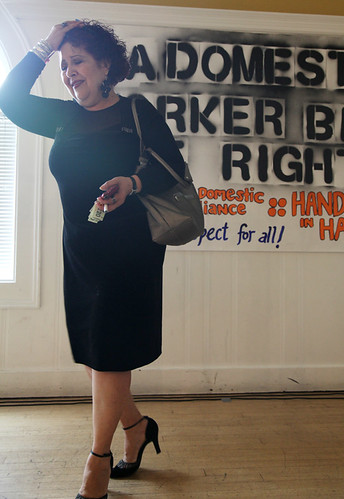
Calls for paid sick days, overtime pay and a safe and healthy workplace were just some of the demands that had men and women packed in a meeting room in the Mission March 6 calling out in chorus, “Si se puede!”
The list is part of the California Domestic Workers Bill of Rights, a document outlining steps for better treatment of the state’s estimated 200,000 household workers, including nannies, housekeepers and caretakers for the elderly or disabled. The California legislation, which is modeled on a successful effort that became law in New York last year, is slated to be heard in committee March 20.
“So many of us want to be good employers, but we don’t know how,” said Jessica Lehman, a leadership organizer for Hand in Hand, a group that advocates for education of domestic employers.
Lehman told the crowd, “If we’re going to have justice overall, we need to be standing together.”
Supporters hope that their push for greater protections for household workers will soon be realized after Tom Ammiano, the state assemblyman who represents San Francisco, and fellow assemblyman V. Manuel Perez of Coachella introduced AB 889, which includes the bill of rights, to the legislature Feb. 17.
“This is a job that should be treated like any other job,” said Lehman.
Activists say that the bill will give employees greater access to basic workers rights such as rest breaks, workers compensation and, for live-in employees, the right to at least eight hours of sleep.
Opponents of the bill, however, say that several of its provisions are unreasonable for household employees and that other items are already covered under federal law.
Kathleen Webb, president of HomeWork Solutions, a Virginia-based payroll company that deals primarily with nanny services, said while she understands that there are some situations that require attention, the federal Fair Labor Standards Act already provides most of the demanded protections.
“They can make it stronger, but these laws are simply duplicating existing laws,” Webb said.
Webb also said that most employers are not trying to treat their employees badly.
“Most nannies have written work agreements with their employers, and anything that’s violated is usually a misunderstanding,” Webb said. “It’s because they just don’t know the law.”
Many domestic workers, however, tell a different story. Several women spoke at the Sunday rally to share their poor experiences with employers. Patricia Aceberos, who has been a domestic worker for more than eight years, explained reasons behind each of the points for the crowd.
She said that the notice of termination demand was important because: “At least (employers) need to give you a time. When they tell you that day or the next that you don’t have to come back to work, then you don’t have time to take care of yourself.”
Webb said that this demand is unrealistic.
“There are many instances where workers in any field do not receive notice that they’re being fired. These decisions are usually made spur-of-the-moment,” Webb said. “A company could declare Chapter 11, you go to work that day and the doors are locked and that’s it.”
Amy Cray, a domestic employer who also spoke at the Mission event, spoke of her family’s nanny, Cecilia, and how household workers are often more than employees and part of the family.
“For the four years she’s raised our daughter, I wouldn’t have been able to go out the door, go to work, to be successful in my career without her,” Cray said.




